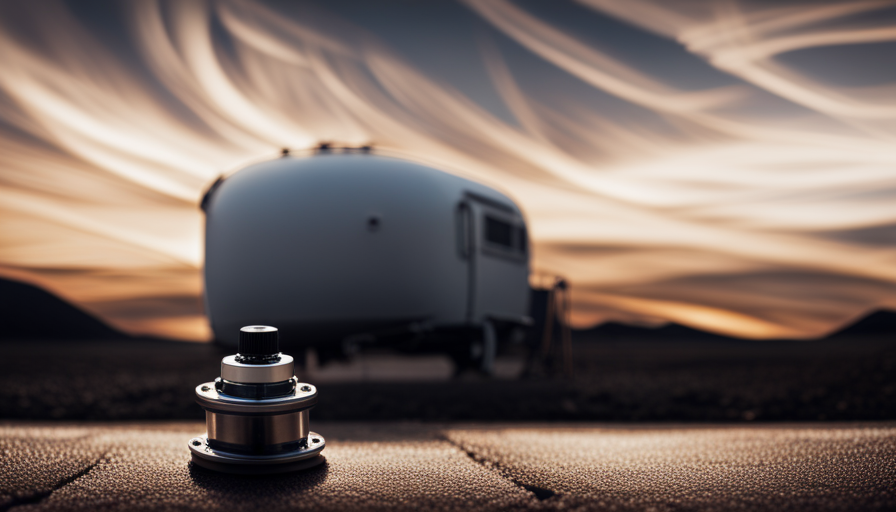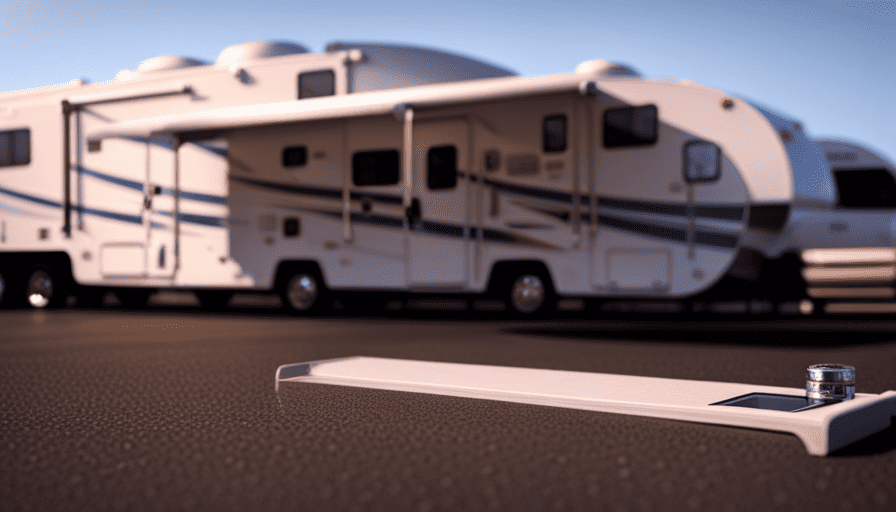Have you ever questioned the distinction between a camper and an RV? Let me explain, it’s not just about size.
Imagine you’re planning a road trip with your family. You want to explore the great outdoors, but you also want the comfort and convenience of home. That’s where the difference between a camper and an RV comes into play.
Think of a camper as a cozy cabin on wheels. It’s compact, easy to tow, and perfect for those weekend getaways.
On the other hand, an RV is like a luxurious mobile home. It’s spacious, fully equipped with modern amenities, and designed for longer trips or even full-time living.
From size and space to mobility and maneuverability, there are several factors that set campers and RVs apart. In this article, we’ll delve into the details of these differences, exploring everything from amenities and features to cost and versatility.
So whether you’re a seasoned traveler or a curious newbie, join us as we unravel the distinctions between campers and RVs and help you find the perfect fit for your adventures.
Key Takeaways
- Campers are compact and easy to tow, while RVs are larger and more spacious.
- Campers are more affordable and require less maintenance compared to RVs.
- Campers are designed for off-road adventures and can reach remote locations, while RVs are limited to paved roads and established campsites.
- RVs are ideal for larger groups and longer trips, while campers are perfect for solo travelers or couples.
Size and Space
There’s a significant difference in the size and space between a camper and an RV. When it comes to size, campers are generally smaller and more compact compared to RVs. They are designed to be lightweight and easy to tow, making them ideal for those who want versatility of use and love outdoor activities. Campers are perfect for weekend getaways or short trips where you don’t need a lot of living space. They typically have a small kitchenette, a bed, and sometimes a small bathroom. Despite their smaller size, campers can still provide all the basic amenities needed for a comfortable camping experience.
On the other hand, RVs offer more space and amenities. They are like a home on wheels, with larger living areas, full kitchens, multiple sleeping areas, and even bathrooms with showers. RVs are perfect for long trips or extended stays, as they provide more comfort and convenience. With their larger size, RVs offer more storage space for all your gear and belongings. They are also equipped with additional features like air conditioning, heating, and entertainment systems.
Moving on to mobility and maneuverability…
Mobility and Maneuverability
When it comes to mobility and maneuverability, campers and RVs offer distinct advantages that cater to various travel preferences.
Campers, also known as travel trailers, are typically smaller and more lightweight than RVs, making them easier to tow and maneuver on the road. They are designed to be pulled by a vehicle, which allows for greater flexibility in terms of parking and navigating tight spaces. However, campers may face some maneuverability challenges due to their longer length and limited visibility when towing.
On the other hand, RVs, also known as motorhomes, are self-contained units that have their own engine and can be driven independently. This gives RV owners the freedom to explore different destinations without the need for a separate towing vehicle. RVs offer better visibility and control on the road, making them more suitable for long-distance trips and navigating crowded highways. Additionally, RVs often come with features like power steering and advanced suspension systems, which further enhance their maneuverability.
Both campers and RVs have their own advantages when it comes to mobility and maneuverability. Campers are easier to tow and park, while RVs provide better control and visibility on the road. These differences in mobility and maneuverability contribute to unique road trip experiences for travelers.
Moving on to the next section, let’s explore the amenities and features offered by campers and RVs.
Amenities and Features
When it comes to comparing campers and RVs, one of the key differences lies in the amenities and features they offer. A camper typically provides basic amenities such as a bed and a small kitchenette, allowing for a comfortable night’s sleep and the ability to prepare simple meals.
On the other hand, an RV is fully equipped with a kitchen, bathroom, and sleeping quarters, providing a more luxurious and convenient experience on the road. Whether you prefer a minimalist camping experience or the comforts of a home on wheels, understanding the amenities and features of campers and RVs can help you make the right choice for your next adventure.
Camper: Basic amenities such as a bed and small kitchenette
You’ll love the cozy atmosphere of a camper, complete with a comfortable bed and a convenient small kitchenette. Here are some reasons why campers are a great choice for those looking for a compact and low-maintenance option:
-
Size and Weight: Campers are typically smaller and lighter than RVs, making them easier to tow and maneuver. They’re perfect for solo travelers or couples who want a more nimble and efficient vehicle.
-
Maintenance and Upkeep: With fewer amenities and features, campers require less maintenance and upkeep compared to RVs. This means less time spent on repairs and more time enjoying your outdoor adventures.
-
Affordability: Campers are generally more affordable than RVs, making them a budget-friendly option for those who want to experience the joy of camping without breaking the bank.
Moving on to RVs, they offer a whole new level of comfort and convenience with a fully equipped kitchen, bathroom, and sleeping quarters.
RV: Fully equipped with a kitchen, bathroom, and sleeping quarters
An RV offers the convenience of a fully equipped kitchen, bathroom, and sleeping quarters – who wouldn’t want to bring their home on wheels with them on their camping adventures?
RVs come in various sizes and weights, ranging from compact models to large ones that can accommodate a whole family.
When it comes to fuel efficiency, RVs typically have lower mpg compared to smaller campers, due to their larger size and weight. However, advancements in technology are constantly improving fuel efficiency in newer models.
It’s important to consider the size and weight of the RV when planning your trips, as it may affect maneuverability and accessibility to certain camping sites.
Now, let’s transition into the next section about the cost of owning an RV.
Cost
The cost of a camper versus an RV can vary significantly, making it an important factor to consider when deciding which option is best for your budget. When comparing the cost of campers and RVs, there are a few key considerations to keep in mind.
Firstly, the initial purchase price of a camper is generally lower than that of an RV. Campers are often smaller and less equipped than RVs, which contributes to their lower price point. However, it’s crucial to consider long-term maintenance costs as well. RVs generally require more maintenance due to their larger size and complex systems, which can result in higher repair and upkeep expenses over time.
Additionally, it’s important to factor in the cost of fuel when comparing campers and RVs. RVs tend to have larger engines and poorer fuel efficiency than campers, which can significantly impact your overall expenses, especially if you plan on traveling long distances. On the other hand, campers are generally more fuel-efficient, which can help save money in the long run.
When considering the cost comparison between campers and RVs, it’s essential to take into account both the initial purchase price and the long-term maintenance expenses. While campers may have a lower price tag upfront, RVs can incur higher maintenance costs over time. Furthermore, the cost of fuel should also be considered, as RVs tend to be less fuel-efficient.
Taking these factors into consideration will help you make an informed decision based on your budget and travel needs.
Moving on to the next topic, let’s explore the versatility of campers and RVs.
Versatility
When considering which option is best for your travel needs, it’s important to understand the versatility of campers and RVs and how it can impact your overall experience.
Did you know that RVs have the ability to accommodate larger groups of people, making them a great choice for family vacations or group outings? RVs typically feature multiple sleeping areas, dining spaces, and even separate bathrooms, providing ample room for everyone to relax and enjoy their time on the road. This versatility allows for more comfort and convenience, especially during extended trips.
On the other hand, campers are generally smaller and more compact, making them ideal for solo travelers or couples seeking a more intimate experience. While they may not offer as much space as an RV, campers are still equipped with essential amenities like a bed, kitchenette, and storage options.
Whether you’re looking for a spacious home on wheels or a cozy retreat, understanding the versatility of campers and RVs can help you choose the option that best suits your needs and budget.
Speaking of budget, let’s now explore the accessibility of these vehicles and how it ties into the overall decision-making process.
Accessibility
When it comes to accessibility, there is a clear distinction between campers and RVs. Campers have the advantage of being able to reach remote and off-road locations, allowing us to truly immerse ourselves in nature and explore more secluded areas.
On the other hand, RVs are limited to paved roads and established campsites, restricting our options and preventing us from venturing off the beaten path.
This difference in accessibility is an important consideration for those seeking a more adventurous and unrestricted camping experience.
Camper: Can reach remote and off-road locations
Camper vans are designed to easily access remote and off-road locations, allowing adventurers to explore untouched landscapes. With their off-road capabilities, these compact vehicles can handle rough terrain and navigate through challenging environments that traditional RVs may struggle with.
Whether it’s traversing rugged mountain trails or venturing into secluded forests, camper vans provide the freedom to reach places that are inaccessible to larger vehicles. Equipped with sturdy suspension systems, high ground clearance, and durable tires, these vans can handle the bumps, dips, and obstacles that come with off-road travel. Their compact size also allows for easier maneuverability on narrow and winding paths.
In contrast, RVs are typically limited to paved roads and established campsites, making them less suitable for exploring remote and uncharted territories. However, they offer their own benefits, which we will discuss in the next section.
RV: Limited to paved roads and established campsites
To fully explore remote and off-road locations, you’ll find that RVs are limited to paved roads and established campsites. While RVs offer a comfortable and convenient way to travel and camp, their size and design make them less suitable for rugged terrains and hard-to-reach destinations. RVs often have lower ground clearance and are more prone to damage when navigating rough roads or uneven terrain.
Additionally, the cost of owning and maintaining an RV can be significantly higher compared to a camper. Campers, on the other hand, are specifically designed for off-road adventures. They’re smaller, lighter, and have higher ground clearance, making them more accessible to remote locations. Campers also tend to be more affordable and easier to store when not in use.
Transitioning into the next section about storage, let’s talk about the various options available for keeping your camper safe and secure.
Storage
If you’re looking for a way to maximize your storage space, an RV is the perfect choice for you. RVs are designed with ample storage options, ensuring that you can bring along all the essentials for your camping adventure.
One of the key advantages of an RV over a camper is its portability. With an RV, you have the flexibility to bring along larger items such as bicycles, kayaks, or even a small grill, thanks to the extra storage space. This allows you to fully enjoy your outdoor activities without worrying about leaving anything behind.
In addition to the increased storage capacity, RVs also offer enhanced security for your belongings. Many RVs have lockable compartments and secure storage areas, providing peace of mind when it comes to protecting your valuable items. You can rest easy knowing that your belongings are safe and secure, even when you’re away from your RV.
As we transition to the next topic about durability, it’s important to note that the storage options in an RV are not only spacious but also designed to withstand the rigors of the road. From sturdy cabinets and drawers to reinforced storage compartments, RVs are built to handle the bumps and vibrations that come with traveling. So, if you’re looking for a storage solution that is both practical and durable, an RV is the way to go.
Durability
With its rugged construction and ability to withstand the toughest road conditions, an RV is a reliable and sturdy companion for all of your outdoor adventures. When it comes to durability, RVs are built to last. They’re constructed with strong materials such as fiberglass and aluminum, which can withstand harsh weather conditions and rough terrains. This durability ensures that your RV will remain in good condition for many years, making it a cost-effective choice in the long run.
In addition to their durability, RVs offer a range of features that make them even more appealing. Here are four reasons why RVs are a popular choice among outdoor enthusiasts:
-
Spacious interiors: RVs provide ample space for living, dining, and sleeping, allowing you to bring all the comforts of home on your travels.
-
Convenience: RVs come equipped with modern amenities such as kitchens, bathrooms, and entertainment systems, making your outdoor experience comfortable and enjoyable.
-
Freedom and flexibility: With an RV, you have the freedom to travel wherever you want, whenever you want. You can explore new destinations and stay at different campsites without the hassle of packing and unpacking.
-
Cost-effective: While the initial cost of purchasing an RV may be higher than that of a camper, the durability and features of an RV make it a wise long-term investment.
With their durability and numerous benefits, it’s no wonder that RVs are growing in popularity and availability.
Popularity and Availability
Imagine stepping into the world of outdoor adventure and finding a booming popularity and wide availability of RVs, making it easier than ever to embark on your next thrilling journey. Popularity trends have shown a significant increase in the number of people choosing RVs as their preferred mode of travel and exploration.
From families to solo adventurers, RVs have become a popular choice due to the convenience and comfort they offer. One of the reasons for the surge in popularity is the availability of rental options. Many people who aren’t ready to commit to owning an RV can still experience the joys of RV travel by renting one. This allows them to test the waters and see if RVing is truly their cup of tea. Rental companies are popping up all over the country, offering a wide range of RV models to suit different needs and budgets.
The increased popularity and availability of RVs have also led to a wider selection of features and amenities. From compact campervans to luxurious motorhomes, there’s an RV for every type of traveler. Whether you prefer a more rustic camping experience or a fully equipped home on wheels, you can find an RV that suits your preferences.
Moving on to the next section about personal preference and lifestyle, it’s important to consider factors such as size, layout, and amenities that align with your individual needs and desires.
Personal Preference and Lifestyle
When it comes to choosing an RV, you’ll want to consider your personal preferences and lifestyle to find the perfect fit for your adventuring needs. One of the key factors to consider is personalization options. RVs offer a wide range of customization options, allowing you to create a living space that suits your style and needs. You can choose different layouts, furniture options, and even add features like solar panels or satellite TV. This level of personalization ensures that your RV feels like a home away from home.
Another aspect to consider is the maintenance and upkeep required for each type of vehicle. Campers tend to be smaller and more compact, making them easier to maneuver and maintain. On the other hand, RVs are larger and may require more regular maintenance, such as oil changes and tire rotations. Additionally, RVs often come with more complex systems, such as plumbing and electrical, which may require occasional repairs. It’s important to factor in the time and cost associated with maintenance when choosing between a camper and an RV.
Overall, personal preference and lifestyle play a significant role in choosing between a camper and an RV. The level of personalization options available and the maintenance and upkeep required are important considerations. By taking these factors into account, you can find the perfect vehicle that meets your needs and allows you to embark on unforgettable adventures.
Frequently Asked Questions
Can a camper be used as a full-time residence?
Living in a camper full-time can be an adventure! Picture yourself waking up to breathtaking views, all while being able to change your scenery whenever you please. However, it’s not all sunshine and rainbows. The pros include flexibility, cost savings, and simplicity.
On the other hand, cons may include limited space and the need for careful planning. Converting a camper into a full-time residence requires careful consideration of essentials like insulation, storage, and power sources.
Are there any restrictions on where you can park or camp with an RV?
There are various regulations and restrictions regarding parking and camping with an RV. Different cities and jurisdictions have their own parking regulations, which may limit where you can park your RV overnight or for extended periods.
Additionally, some areas require camping permits for RVs, especially in designated campsites or recreational areas. It’s important to research and familiarize yourself with the specific rules and regulations of your desired location to ensure compliance and a hassle-free experience.
How much does it cost to maintain and repair a camper or RV?
How much does it cost to maintain and repair a camper or RV? Are you prepared for the financial commitment?
The cost of maintenance and repair expenses for campers and RVs can vary depending on several factors. Regular maintenance tasks such as oil changes, tire rotations, and inspections can cost a few hundred dollars annually. However, major repairs like engine issues or water damage can be much more expensive, ranging from a few thousand to tens of thousands of dollars.
It’s important to budget for these potential costs to ensure a smooth and worry-free camping experience.
Can an RV or camper be rented for a short-term vacation?
Yes, both RVs and campers can be rented for short-term vacations. There are various renting options available, such as through rental agencies, RV dealerships, or peer-to-peer rental platforms.
Renting an RV or camper for a short-term vacation has several benefits. It provides flexibility to explore different destinations, the convenience of having your own living space, and the ability to enjoy outdoor activities while still having access to amenities like a kitchen and bathroom.
What are the pros and cons of buying a used camper or RV versus a new one?
When considering purchasing a used camper or RV, there are several pros and cons to weigh. Financing a used vehicle may offer lower monthly payments, but it’s important to factor in potential maintenance and repair costs.
When choosing between a travel trailer or a motorhome, consider factors such as size, mobility, and amenities. Travel trailers are generally more affordable and versatile, while motorhomes offer more convenience and comfort.
Ultimately, the decision depends on individual preferences and needs.
What Size Generator is Suitable for an RV?
Choosing the right size generator for a camper is crucial for a seamless outdoor experience. The power needs of an RV vary, depending on the appliances and systems you have onboard. To prevent any electrical issues, it’s important to determine your camper’s wattage requirements and select a size generator for camper that can handle the load. This ensures a reliable power source while you enjoy your adventures on the road.
Conclusion
In conclusion, it’s clear that the differences between a camper and an RV are vast. From size and space to amenities and features, the contrasts are striking.
It’s ironic how these two vehicles, although similar in purpose, cater to different needs and preferences. While campers offer mobility and affordability, RVs provide luxury and comfort.
Nevertheless, personal preference and lifestyle ultimately dictate which option is chosen. So, whether you prefer the simplicity of a camper or the extravagance of an RV, choose wisely and embark on your adventures with a touch of irony in your heart.










